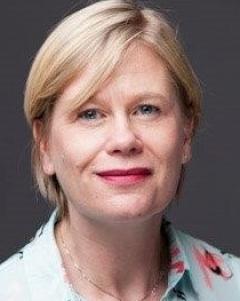You are here
- Home
- Our student stories
- Julie Perry
Julie Perry

Julie began her MBA in 2009 after the company she was working for at the time offered to fund her studies. After climbing the ladder within the business, and later taking voluntary redundancy, she is now working on building a non-executive portfolio career.
“I’ve always had a passion for lifelong learning. I am always trying to expand my brain. So, when work offered to fund my MBA for me, I didn’t think twice. I was working at Aviva and had a brilliant boss at the time.
“The MBA gave me a variety of options so I carefully considered my choices. For example, I picked a Financial Strategy module because at the time I was working with a financial services risk team, and I needed to get my head around some elements of the role. Even now, I still have all my books in the cabinet, and I still go back to them a few times a year to guide me through whatever’s going on at the time.
“After I finished my MBA, I was able to change direction. I’d always worked in the UK market and was based in Norwich but I moved division and location. I left to work in Aviva’s global head office in the City. I’d come from a council estate in Sheffield and I’d found myself working in the City! But my MBA gave me the confidence to thrive within a very different culture. People were very interested in my studies and several have gone on to do further study themselves so I felt like a local ambassador having reignited their passion for learning.
“I was doing a lot of travelling at the time when I was studying, with a three-hour daily commute. This was unproductive time, until I started studying. Then I used to take a train that stopped at every station and took 15 minutes longer, and I’d have a flask of tea, a butty and my books with me, and I’d get my background reading done.
“I had minimal social life for three years while I studied. When I started, my son was 10, so he used to do his homework at the breakfast bar while I did my studying. He quite liked that we were both working together, it instilled a strong work ethic in him. My husband had to step in at home, and it was so important that I had that support. I also had to learn to undo bad habits, and start being a bit selfish by saying ‘no!’ to people because I had new priorities. So I gained some softer skills from my studies, too.
“I found that what worked for me was putting stakes in the ground so I always knew what I was aiming for. I broke it all up into little chunks but always knew what I was working towards.
“In the middle of my last year, I got carpal tunnel syndrome and had to have surgery. I was in pain for three or four months, and using a pen was interesting! I had to learn to do all my notes on my tablet as I didn’t pick up a pen for three months. But it forced me to make the move to using technology in a better way and I still do all my notes on my tablet now. I was in a lot of discomfort at exam time and the OU gave me a break halfway through and an extra 15 minutes at the end. There’s no way I could have done the exam without that.
“I did some residential courses during my studies, too, and there was something very special about the diversity element of those. All of a sudden, I had access to people from so many professions and different ways of life. Until then, I’d only known Aviva! But, despite everyone’s differences, the problems we were dealing with were similar. These experiences brought into sharp focus the core transferable skills I have learned and developed in my career and studies.
“As part of my final MBA assignment, while I was working in the City, I decided that I wanted to embark on a new path and develop a portfolio of non-executive roles. Initially I took on a voluntary role with a mid-sized Multi-Academy Trust. It’s pro bono and unpaid but it’s given me the chance to apply my skills in a different field. I started six years ago and now I’m chair, overseeing 4,500 students and 900 staff.
“I took redundancy from Aviva three years ago, and my MBA gave me the courage to use this as an opportunity to do something difficult and realise my ambition to do something for the greater good. The Open University had given me the tools and techniques to help me deal with what I call my ‘messy brain’, to structure and organise my thoughts. Doing the MBA had given me the confidence to take on that role in London, which had made my family secure, and meant I was able to take voluntary redundancy.
“The OU is an accessible route for people with busy lives and who have lots of different ‘hats’ – as a parent, a spouse, an employee and so on. Distance learning isn’t for everyone – you have to commit to being very disciplined and prioritising your time. But the flexibility it gives you is unmatched.”
